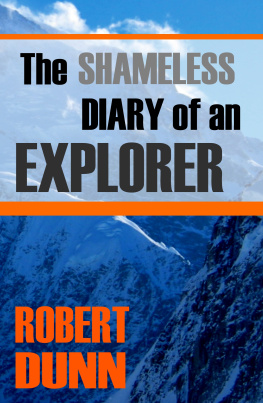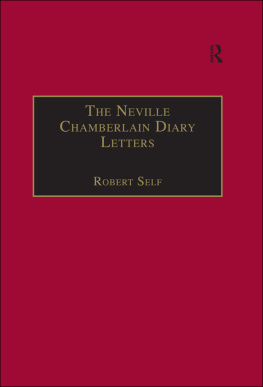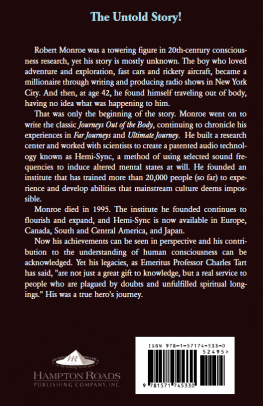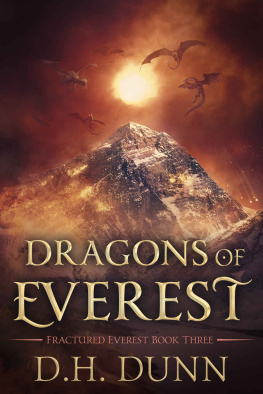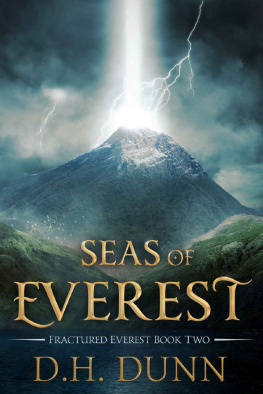Robert Dunn - The Shameless Diary of an Explorer
Here you can read online Robert Dunn - The Shameless Diary of an Explorer full text of the book (entire story) in english for free. Download pdf and epub, get meaning, cover and reviews about this ebook. year: 2016, publisher: Independently published, genre: Non-fiction / History. Description of the work, (preface) as well as reviews are available. Best literature library LitArk.com created for fans of good reading and offers a wide selection of genres:
Romance novel
Science fiction
Adventure
Detective
Science
History
Home and family
Prose
Art
Politics
Computer
Non-fiction
Religion
Business
Children
Humor
Choose a favorite category and find really read worthwhile books. Enjoy immersion in the world of imagination, feel the emotions of the characters or learn something new for yourself, make an fascinating discovery.
- Book:The Shameless Diary of an Explorer
- Author:
- Publisher:Independently published
- Genre:
- Year:2016
- Rating:4 / 5
- Favourites:Add to favourites
- Your mark:
- 80
- 1
- 2
- 3
- 4
- 5
The Shameless Diary of an Explorer: summary, description and annotation
We offer to read an annotation, description, summary or preface (depends on what the author of the book "The Shameless Diary of an Explorer" wrote himself). If you haven't found the necessary information about the book — write in the comments, we will try to find it.
The Shameless Diary of an Explorer — read online for free the complete book (whole text) full work
Below is the text of the book, divided by pages. System saving the place of the last page read, allows you to conveniently read the book "The Shameless Diary of an Explorer" online for free, without having to search again every time where you left off. Put a bookmark, and you can go to the page where you finished reading at any time.
Font size:
Interval:
Bookmark:

THE SHAMELESS DIARY
OF AN EXPLORER
BY ROBERT DUNN
COPYRIGHT 2016 BIG BYTE BOOKS
Discover more lost history from BIG BYTE BOOKS
Get your FREE EBOOK join our mailing list to get notified of great new (old) books and the latest blog posts.
BIG BYTE BOOKS is your source for great lost history!
Robert Dunns 1907 book on the 1903 exploration of Denali deserves a place as a classic of the mountain-climbing and exploration genre. Rather than a heroic tale of selfless sacrifice that was popular in the day, Harvard-educated Dunns account is rife with petty squabbles, failures, and a great deal of humor.
The expedition was led by the Professor, as Dunn calls him throughout the book. This was Dr. Frederick A. Cook, a well-known explorer of the period, who claimed he reached the summit of Denali in 1906 but it was later determined that he only reached Fake Peak. The author states below that the Professor was the team topographer but the New York Times of October 25, 1903 listed Seattleite Walter Miller in that role.
Dunn was the expedition geologist and second-in-command, having some previous experience with difficult exploration in 1898. The botanist he called Simon was Ralph Shainwald, also a veteran of a previous expedition. Dunn lists Fred King of Montana but the Times lists another man from that state, Mr. Ridprintz, as well as a man named Carroll and two Native Americans.
Dunn could write and he could bite, and he bit and wrote through with us for months, said his mentor, famous New York correspondent, Lincoln Steffens. Four pages of Steffens autobiography were devoted to Dunn. The odd thing about Dunn is that he was the most literary of the writers he affected to despise, the most idealistic. Dunn has written novels, or rather he has overwrittenbook after book of beautiful truth. He and he alone of them all was an artist for arts sake.
Of the circle of Harvard men on the staff of the New York Commercial Advertiser when he worked there, Dunn said, Every Harvard man has a pose except me. And thats mine: to have no pose.
In 1908 Dunn led the first ascent of Mount Wrangel in Alaska and in 1913 explored the Kamchatka River in Siberia.
In 1915, as the horrors of World War I were shattering Europe, 38-year-old Dunn went to report from the scene for the New York Post . He published an account titled Five Fronts , after visiting the fronts of the English, French, Austrian, German, and Russian troops. According to the New York Times review of the book, Dunn at one point accepted a German lieutenants offer to fire off a couple of rounds in the direction of the French linessomething the Times thought not very nice. He was, however, much lauded for his account of the British retreat from Le Cateau.
The very next year, Dunn was with General John Black Jack Pershing on his expedition into Mexico after Pancho Villa. When the U.S. entered WWI, 41-year-old Dunn enlisted in the Navy and served as an intelligence officer in London. He attended the Peace Conference in Paris and then retired a lieutenant commander.
The 1920 census found our author living in Somers, New York, with a brother and sister, all close in age and all unmarried, in the house of their mother. He remained there for decades working on his writing and horticulture. Robert Steed Dunn died after a long illness on December 24, 1955 at his home in Katonah, New York.
THE MASTER MOTIVE
This is the story of a failure. I think that success would have made it no more worth telling. It is about an exploring party, the sort that so often fails....
Fountains of youth, or eldorados, or wider realms for cross and consciencethese seemed to lure a younger world to unknown regions. To-day men explore for the iron crown of science; they say that they do, at least.
But I believe that neither biology to-day, nor gold nor the creeds of old, have ever been the explorers master motive. His real ardor is more profound. It has revealed and civilized our sphere. It stirs the thirst to discover and subdue which vests the very fiber of our race; makes us ache for tumult and change, for strife for its own sake against big odds.
The true spirit of the explorer is a primordial restlessness. It is spurred by instincts of pre-natal being and a cloudy hereafter, to search the glamour of unknown peaks and seas and forests for assurance of mans imperfect faith in immortality. It is a creative instinct.
The explorer seldom speaks of it openly; he is not unwilling, but he cannot. He is inarticulate, like the victim of a passion. Few but he can understand his inspiration. The world asks of him purposes more obvious. He cites a widespread fervor; of old, perhaps religion; to-day, he will name science. And these are or have been his impulses, in part; and the world can grasp them. Science is the natural heir to the cross as the public avatar of exploration. Each is sponsor for the Unknowable; one was, one is now, the Aladdin lamp of the Improbable.
But science is a cold ambition, remoter from our master motive than the worlds old notions of exploration, vain as they would seem to-day were they not dead in us. Maybe no peaks remain, flushed with the light that forswears mortality; no unknown seas to shatter doubt with wonder. That I do not believe. For men still roam over a world too wide for any map, and when restlessness and action for its own sake inspire us no more, our race will deserve to die.
All reverence to science! Yet I know this: The elder explorers related what quickened the life and visions of their time, and quickens ours, rousing men to ever harder ventures. Few who seek the iron crown stir us so now. Few men in the street see the use of exploration, in the North, especially. To many, explorers seem vain men seeking short cuts to fame, or persons who waste time, energy, and wealth, to win the Impossible, to learn the Unprofitable. And this cynicism appears to be not all the fault of laymens apathy, or of explorers dumbness.
If the earth is smaller and tamer than in the old days, our sympathies are warmer and the whole worlds heart is more alert. It craves, above all, knowledge of itself, for it is a more complex and interesting old world. The life of man as it is, naked and unshadowed, brutal maybe, life under every stress of fortunethat wins the hungry ear and the deeper charity of these present hours. And life has thus been searched and exploited almost everywhere all lands over, except: Among us who seek on enchanted rivers an answer to those underthoughts that make life at once a tragic and an ecstatic thing, who dare for nothing but the cause of daring, who follow the long trails.
Men with the masks of civilization torn off, and struggling through magic regions ruled over by the Spirit of the North or of the South; human beings tamed by the centuries, then cast out to shift for themselves like the first victims of existencethey must offer the best field of all to help this knowledge of ourselves. He knows life best who has seen it nakedest, and most exotic. So he that goes plain-spoken from the city to the outer waste should become indeed quite wise. He might tell how the weaklings eyes blazed with courage and reproach when his leader turned back disheartened, or in what words the athlete of the avenue may be the first to whimper at starvation; and men would sit up and see some of their children in a very, very large perspective. And in telling the truth about others, a man might reveal it about himself, which would be best of all.
The passions of the long trail bring out the best in men and the worst, and all in scarlet; and while the law of compensation, which keeps life livable, provides that in the after-memories which form existence, only what is pleasant survives, I hold that it is unfair to nature and the blessed weaknesses which make us human to divert by one hairs breadth in any record of the trail from facts as you saw them, emotions as you felt them at their time. To distort or hide, in deference to any custom, or so-called sense of pride or honor, simply is to lie. The tragic moments in the heat of the trails struggle, the event as it affected you as you then wereto note that with all the passion or heroism, the beastliness or triumph, of the momentmust not such a record in the end turn out all fair? And true as can be?
Next pageFont size:
Interval:
Bookmark:
Similar books «The Shameless Diary of an Explorer»
Look at similar books to The Shameless Diary of an Explorer. We have selected literature similar in name and meaning in the hope of providing readers with more options to find new, interesting, not yet read works.
Discussion, reviews of the book The Shameless Diary of an Explorer and just readers' own opinions. Leave your comments, write what you think about the work, its meaning or the main characters. Specify what exactly you liked and what you didn't like, and why you think so.

